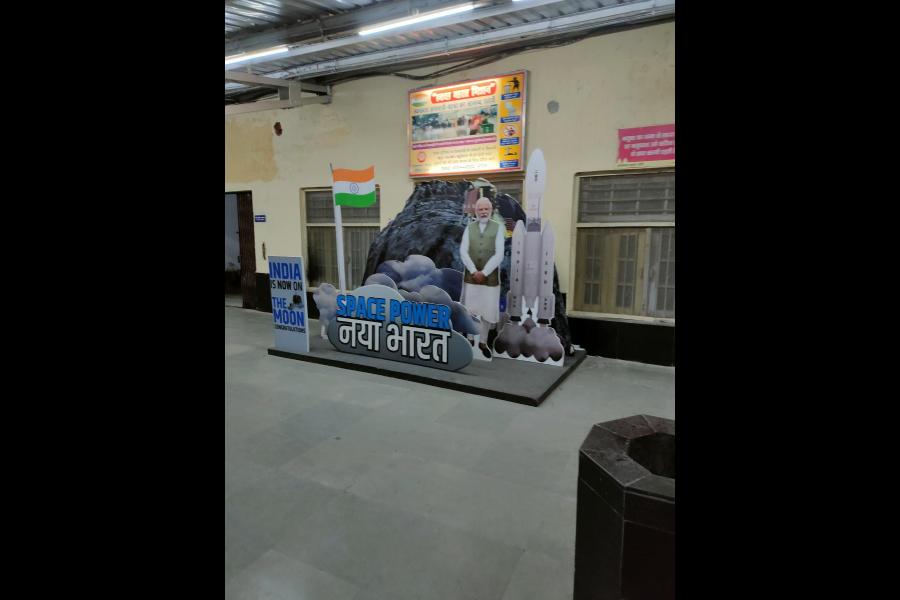Activists and academics have underlined an “increasing trend” among public institutions to hide information sought under the Right to Information (RTI) Act, with their officials apparently afraid of punishment if they reveal information inconvenient to the authorities.
They have cited the instance of the railways transferring a senior official after information about the expenditure on selfie points set up at the stations, with cut-outs of the Prime Minister, was revealed to an RTI applicant, Ajay Bose.
Sources said the official transferred, Shivraj Manaspure, chief public relations officer with Central Railway (CR), had provided the data to the central public information official (CPIO) concerned, who relayed it to the applicant.
According to the response of December 21 last year, the railways had spent Rs 1.25 lakh on the temporary installation of 3D selfie points and Rs 6.25 lakh on the permanent installation of 3D selfie booths at CR railway stations. Manaspure was transferred on December 29.
Deepak Malghan, a faculty member at IIM Bangalore, on Thursday wrote a post on X accusing the B-school of denying information to RTI applicants.
“Our best public institutions have been wantonly using ‘no information on record’ to hold back any information that would hold them to account,” Malghan wrote.
“As an example at my own institute, it is an open secret that the administration recently appointed a chair professor even when the appointee was undergoing an inquiry for caste abuse. However, the institute has over 3 different RTI responses (including one worded precisely using formal logic), and two appeals refused to reveal even the number of such instances.”
He added: “Directors routinely vet RTI responses at IITs and IIMs before they are released.”
Malghan did not wish to comment on his post.
However, sources said he had filed an RTI application with his own institute seeking the number of instances of its employees being accused of caste discrimination.
An email was sent to IIM Bangalore director Rishikesha T. Krishnan seeking the institute’s reaction to the allegation about a practice of information denial. His response is awaited.
The Telegraph had last month filed an RTI application to obtain a copy of the minutes of the July 23 meeting of the board of governors of IIM Indore, held to select a new director. The institute denied the document, saying the information sought was confidential.
RTI activist Anjali Bhardwaj said it was deeply concerning that officials were apparently being punished for revealing information under the RTI Act.
She said that it’s the “people seeking information under the RTI Act” that were often “targeted by the aggrieved parties”.
“It’s deeply concerning that officials are being targeted too,” she said.
“Transferring an official without citing any reason after the release of data on the cost of (setting up) selfie points only suggests a signal to other officials handling RTIs to deny information.”
Bhardwaj said officials were increasingly denying information that was inconvenient to the government. In such instances, the applicants had to challenge the denial before the Central Information Commission (CIC) or the state information commissions.
However, the positions in many of these commissions are largely vacant. The 11-member CIC is currently managed by three members.
After the Central Railway released the data about the expenditure on selfie points, Bhardwaj said, the railways are believed to have decided that their public information officers (PIOs) will have to obtain approval from higher authorities — such as the general manager or divisional manager — before sharing any information.
“This is an extralegal step. Under the RTI Act, there is no provision for the PIO to get clearance from higher authorities,” Bhardwaj said.
“The railways are giving this plea that this decision has been taken because the quality of responses has deteriorated. If the PIOs are not doing their jobs well, the general manager or divisional manager should be made the PIO. But this is being done to ensure that no crucial information is released to the public.”
RTI activist Nikhil Dey said: “The message has already reached the PIOs that they should not release data that is inconvenient to the government. The recently passed data protection law is another weapon to deny crucial data. The law has expanded the definition of privacy and allowed the PIOs to deny information citing privacy.”










